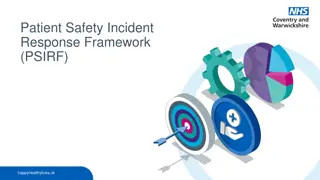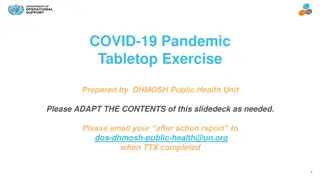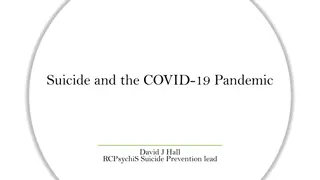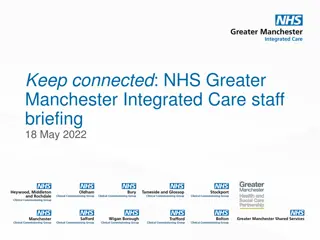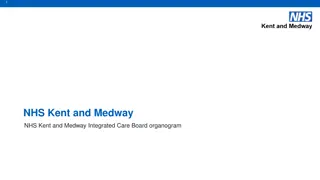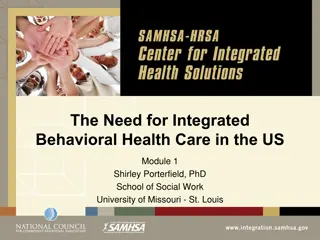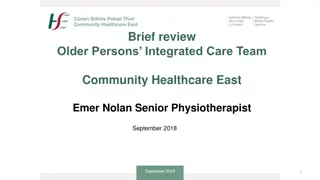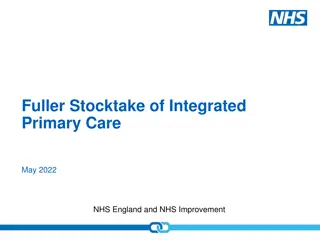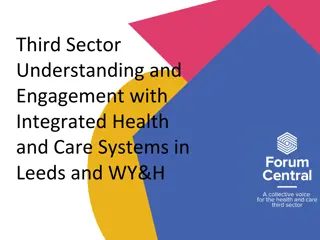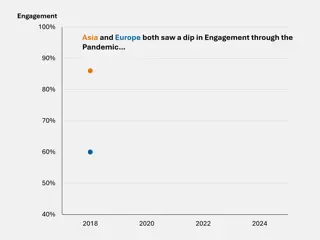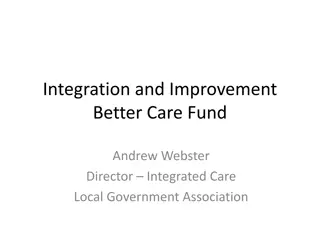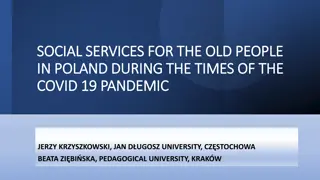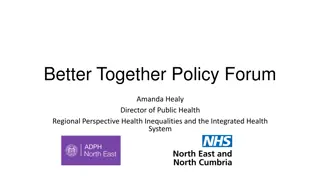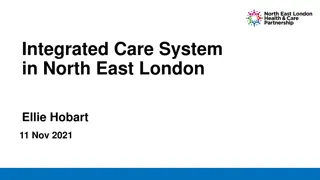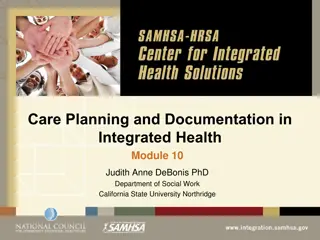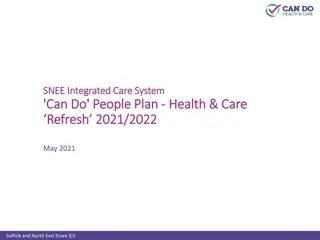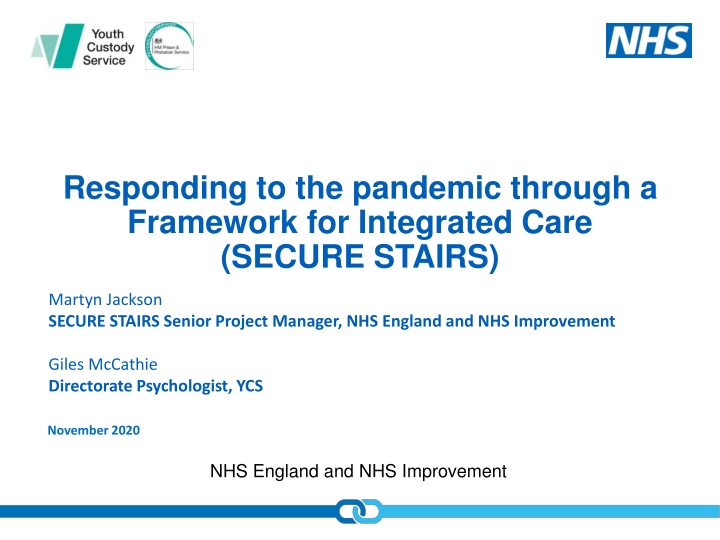
Enhancing Integrated Care with SECURE STAIRS Framework
"Learn about NHS England's SECURE STAIRS Framework for Integrated Care, focusing on collaborative multi-disciplinary approaches within secure youth facilities. Explore the context, evidence base, and the essential components of SECURE Foundations and STAIRS Shared Understanding. Discover how this innovative framework promotes better outcomes for young people in secure settings."
Download Presentation

Please find below an Image/Link to download the presentation.
The content on the website is provided AS IS for your information and personal use only. It may not be sold, licensed, or shared on other websites without obtaining consent from the author. If you encounter any issues during the download, it is possible that the publisher has removed the file from their server.
You are allowed to download the files provided on this website for personal or commercial use, subject to the condition that they are used lawfully. All files are the property of their respective owners.
The content on the website is provided AS IS for your information and personal use only. It may not be sold, licensed, or shared on other websites without obtaining consent from the author.
E N D
Presentation Transcript
Responding to the pandemic through a Framework for Integrated Care (SECURE STAIRS) Martyn Jackson SECURE STAIRS Senior Project Manager, NHS England and NHS Improvement Giles McCathie Directorate Psychologist, YCS November 2020 NHS England and NHS Improvement
What is the Framework for Integrated Care (SECURE STAIRS)? SECURE STAIRS is an NHS England led project, being delivered in partnership: Her Majesty s Prison and Probation Service (HMPPS) Youth Custody Service (YCS) HMPPS Psychology Services Group Ministry of Justice (MoJ) The Department for Education (DfE) Development of a Framework for Integrated Care. A revised Approach: A whole system approach to integrated care within the Children and Young People Secure Estate Embedded(rather than in-reach ) mental health staff Consistency of staffing on residential areas Multi-disciplinary working through the unit based Support Team Young people co-produce their formulation (my story) Front line staff as primary facilitators of change Collaboratively developed formulations recorded on a shared care record, used by all professionals within the multi-disciplinary Support Team and underpinning all Plans. NHS England and NHS Improvement 2 | 2 |
Context and evidence base Emerged from the DART approach, developed working with YP presenting with high risk behaviour and particularly complex needs in the Willow Unit in Hindley YOI (Rogers and Budd, 2015; Ryan and Mitchell 2012). However, draws from a myriad of other innovations that would be consistent with this type of approach such as: Psychologically Informed Planned Environment (PIPES) approach (NOMS and DoH, 2012) Psychologically Informed Environments (Haigh et al, 2012) Trauma Systems Therapy (Saxe et al, 2007) The Enabling Environments initiative (RCPsych) PACE The Sanctuary Model (Bloom, 2005) (Hughes/Golding) NHS England and NHS Improvement 3 | 3 |
SECURE Foundations S staff with skill sets appropriate to the interventions needed E emotionally resilient staff able to remain child-centred in the face of challenging behaviour & emotions C cared for staff: supervision and support U understanding across the establishment of human development, attachment, trauma & other key theories R reflective system, able to consider impact of trauma at all levels E - Every Interaction Matters - a whole system approach NHS England and NHS Improvement 4 | 4 |
STAIRS Shared Understanding T Targets identified that key stakeholders (staff, YP, home ) agree on, that are destination rather than intervention targets, and that are measurable S Scoping the presenting situation clarity re presenting problems, AND resources (inc where is / who is home ?) A Activators: Interventions driven by a multi-factorial/multi-systemic formulation (not predicated on diagnosis/offence) that identifies the activators for this particular problem for this particular young person/family I Interventions aimed at the activators as identified above. Specialist and core interventions tailored to each YP s risks/needs S - Sustainability always in mind, once activators of positive changes identified, main work is how to replicate/sustain these activators. R - Review progress towards agreed targets regularly, both in unit and with home , and revision of plans if no evidence of progress NHS England and NHS Improvement 5 | 5 |
Expected Outcomes & Benefits There are a number of practical examples of what successful implementation of SECURE STAIRS may look like within the Child and Young Person Secure estate. These include; A Reduction in: Caregiver/system anxiety Staff sickness The number of staff injuries Placement/ unit moves for CYP Frequency and severity of high risk behaviours The number of incidents The number of restraints The number of safeguarding referrals The number of self-harm incidents Mental health concerns An increase in: Staff recruitment and Staff Retention Increased CYP resilience and wellbeing. Improved: Staff Confidence and morale Staff satisfaction Staff resilience and wellbeing Relationships and communication between staff and CYP Emotional regulation Consistency of: Staffing on residential areas NHS England and NHS Improvement 6 | 6 |
COVID-19 and the CYPSE With the emergence of the COVID-19 pandemic NHS England and NHS Improvement and Youth Custody Service considered what would be most useful to all staff and children and young people to help keep secure settings safe. Given the likely traumatic impact of COVID-19 on individuals, teams and organisations, promoting trauma-informed and formulation based care remained a priority, as did whole-system approaches to supporting staff and creating change for children and young people within the CYPSE. Therefore the principles of the Framework for Integrated Care (SECURE STAIRS) were agreed to be the solution to provide the sites with the support they required. Formulations prioritised for children and young people who may be particularly at risk Guided Reflective Practice was further implemented to support staff NHS England and NHS Improvement 7 | 7 |
Enhanced SECURE STAIRS In response to COVID-19 an Enhanced SECURE STAIRS Team (ESST) mobilised at pace. The ESST: provided a blanket of support and advice; communicated the vital role social interaction and staff support, at a physical distance, plays during this time; created a joint COVID-19 Dashboard with regular partnership meetings to understand the impact of the disease across the estate; continued regular contact with sites; enhanced the Critical Case Pathway to better understanding the vulnerabilities of children with exceptionally complex needs and better support the staff The ESST built upon the SECURE STAIRS Project Team, which already had the NHSE&I and YCS partnership embedded and included additional colleagues and seniority from across YCS, HMPPS Psychology and NHSE&I. NHS England and NHS Improvement 8 | 8 |
What is the Enhanced SECURE STAIRS offer? Increased capacity including: Additional NHSE&I project and programme management resource to help co-ordinate the support response Additional consultant forensic and child and adolescent psychiatrists with extensive knowledge and a wealth of experience in relation to a myriad of complex mental health issues. Continued regular contact with all sites from the SECURE STAIRS, Central Implementation Team, now virtually and together with additional resource across the partnership. Offer of remote drop in support sessions for all staff within sites, co-ordinated via YCS Psychology services. New weekly meetings to exploring common themes, challenges, lessons learned and areas of good practice to share collaboratively. Creation and monitoring of YCS and NHSE&I COVID-19 Dashboard Working with colleagues across NHSE&I and YCS developed site modelling based upon the daily partnership Dashboard Comprising daily data and weekly highlight report returns to inform a managed support response. NHS England and NHS Improvement 9 | 9 |
What is the Enhanced SECURE STAIRS offer? Collaboratively produced communication and guidance Physical Distancing rather than Social Distancing ACCEPT, CONNECT, REFLECT was collaboratively agreed as a simple framework to guide the enhanced support response for staff, children and young people. ACCEPT: CONNECT: REFLECT: Maintaining/ supporting relationships Managing the uncertainty Embracing complexity Posters, leaflets and guides for both staff and children and young people in relation to psychological awareness, trauma and COVID-19, eg anxiety, autism spectrum disorder (ASD), Obsessive Compulsive Disorder (OCD) and physical distancing. Peer led COVID-19 audio visual messages for the children and young people (CYP) in the secure estate created and distributed to all sites (PeerPower). Creation and distribution of a YCS and NHSE&I newsletter for staff and YCS magazine Inside Weekly / Inside Monthly for CYPs. (YCS Psychology). Collaboratively developing and feeding into HMPPS YCS, PHE, DfE and NHSE&I guidance for CYPSE. NHS England and NHS Improvement 10 | 10 |
What is the Enhanced SECURE STAIRS offer? Enhancing the Critical Case Pathway Additional support for formulation and case management via consultant forensic and child and adolescent psychiatrists in managing most critical and complex cases. Enhanced system of support for critical cases: YCS and NHSE&I collaboratively reviewed the monthly Critical Case Panel, aims, objectives and process Consultation with sites, across all sectors, at Governor/ Director/ Home Manager level Lessons learned from monthly Critical Case Panel Creation of weeklyCritical Case Group Group consultation on ToR and the referral route Ensuring a formulation based approach to care and escalation Developing a full and robust Critical Case Pathway. NHS England and NHS Improvement 11 | 11 |
Benefits of the Enhanced SECURE STAIRS Team a and the products influenced, developed and delivered Increased strategic partnerships Collaborative approach to communication, guidance, monitoring, support and recovery An equivalence of offer for all sites, across all sectors, YOI, STC, SCH, Welfare and Justice Supporting sites to effectively Accept, Connect, Reflect under the impact of COVID-19 Promoting and supporting whole system approaches for integrated care Ensuring the staff are supported Ensuring the children receive individualised care plans and the priority healthcare they need A Critical Case Pathway and additional resource/ support to consider the critical few children and young people in custody whose complexity of need presents exceptional risk to self, others and/ or from others (high harm/ high risk/ high vulnerability) and despite a full integrated multi-agency approach on site, the child or young person remains at risk of harm A Pathway to assist in holding the anxiety of critical cases Using principles of the Framework for Integrated Care (SECURE STAIRS) at a central level and encouraging multi-agency support and the mirroring of these principles of collaboration at every level Advancements in the implementation of SECURE STAIRS and the understanding of the benefits of the principles. NHS England and NHS Improvement 12 | 12 |
Learning to Build Back Better From the outset YCS made an initial commitment to learn from the situation to enable us to Build Back Better . Our ambition was to hear the voices of children and staff to allow us to understand their experiences of the situation, as well as give individuals the opportunity to tell their stories. The COVID Research Evaluation (CoRE) was established to support the YCS recovery working group. The Programme is undertaken by YCS Psychology Services, led by Alisa Purton. The research is coordinated by Dr Lauren Aspey and Laura Morton, under the independent direction of Professor Neal Hazel. The collaboration included YCS, NHS E&I, YCS Psychology and wider HMPPS colleagues. Areas for exploration included: Publichealth (perceptions and experiences of COVID) Activities undertaken Interactions with others Safety and behaviour Wellbeing Roles and responsibilities Development (personal/career/organisation) NHS England and NHS Improvement 13 | 13 |
CoRE Methodology Phase 1:Surveys and Interviews (NRC Approved complete) Surveys with all staff across Childrens Secure Estate (N: 1220) Individual interviews with all Children and Young Adults (N: 391/658; 59%) Phase 2: Exploration of YCS COVID-19 data sources (NRC Approved ongoing) Phase 3: Qualitative Interviews with key partners and stakeholders across YCS (NRC Approved ongoing) NHS England and NHS Improvement 14 | 14 |
Initial learning from Children, Young People and Staff A large majority of children (87%) felt that they had as much information as they needed about the virus and its dangers. Almost all children in YOIs (93%) reported that they felt they had been coping well during the pandemic, and four in five children (82%) reported that the lockdown experience overall had been fine . However, many had found life inside more difficult at times. Two in five (41%) of all the children in YOIs reported that they felt more miserable because of the way things were during the pandemic, a quarter (24%) had felt more anxious, and almost a third had often felt alone (31%). NHS England and NHS Improvement 15 | 15 |
Initial learning from Children, Young People and Staff More than nine in ten children (92%) felt that they were getting on with most staff fine during the pandemic. The large majority of children in YOIs (84%) felt that there have been staff that they could turn to for help if they had a problem during the pandemic period. Three-quarters of children (76%) had been feeling cared for by most staff. Almost all children felt that most staff had been treating them with respect (93%). Four in five children (80%) reported that staff had been treating them as an individual. NHS England and NHS Improvement 16 | 16 |
Initial learning from Children, Young People and Staff Nine in ten staff members reported coping well (89%). However: - High numbers of staff reported feeling more stressed (35%), more miserable (33%); - Almost a third felt they were not achieving a work life balance (32%); - For those impacted by bereavement or COVID-19 related distress, 28% felt unsupported. - 22% reported finding their job more difficult. Nine in ten staff (91%) felt that the best interests of the child has always been a primary consideration during COVID-19. A large majority of the staff felt that they have had a part to play in fighting to protect their workplace from COVID-19 (86%), with the same proportion considering that we ve all been fighting this pandemic together - staff and children (86%). NHS England and NHS Improvement 17 | 17 |
Heather.Whitehead@justice.gov.uk martynjackson@nhs.net Giles.McCathie@justice.gov.uk Helga.Swidenbank@justice.gov.uk

